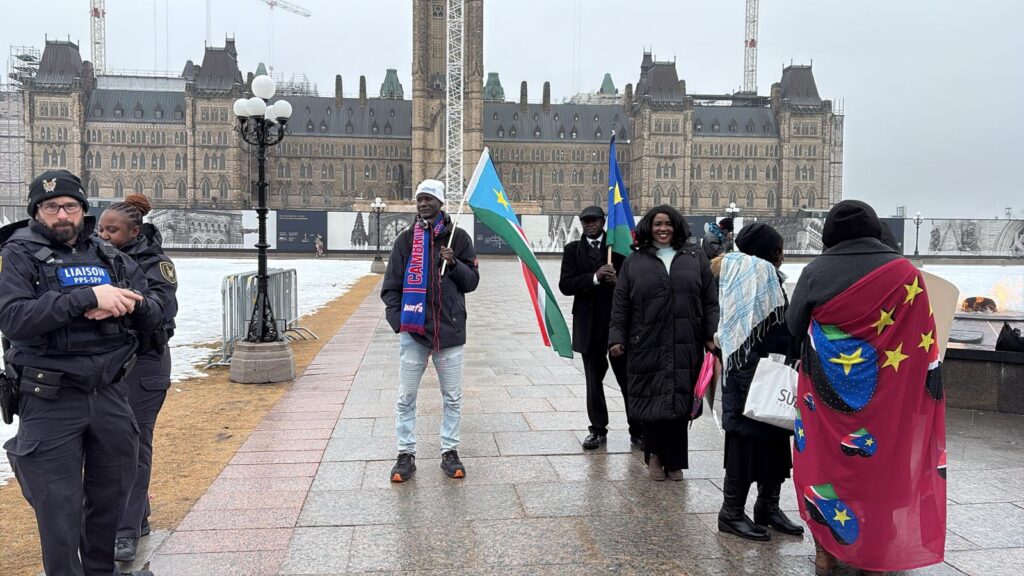When Brian Adeba named his son Biko, it wasn’t merely a tribute to South African anti-apartheid activist Steve Biko, it was a quiet declaration of values.
“He stood up to the might of the apartheid regime, with no weapon, just his words,” Adeba said. “They killed him for it. And his thoughts, wisdom and ideas are why he’s one of the most influential people I’ve admired.”
This reverence for courage rooted in principle — not authoritarianism — defines Adeba’s approach to leadership.
Now, as the Liberal candidate for Kitchener Centre, Adeba stands on the cusp of making Canadian history. If elected, he would be among the first Sudanese or South Sudanese Canadians to serve in the House of Commons — a milestone he carries with humility and a deep sense of community responsibility.
Born in Sudan, Adeba fled to Kenya in the late 1990s to avoid forced military enlistment under what he described as an Islamist government. He arrived in Canada in 2002 through a refugee resettlement program. From working at Loblaws in Ottawa to raising a family, studying public policy and contributing to international discussions as a journalist and policy analyst, Adeba’s story is one of perseverance and purpose.
Throughout his journey, he has remained grounded in the communities that supported him and guided by a firm belief that leadership should never be detached from those it aims to serve.
“A politician doesn’t spring from nowhere,” he said. “They come from a community and from a family.”
Junub is South sat down with Adeba for a wide-ranging conversation about representation, public policy and the importance of civic participation in shaping the future.
Watch the full interview below.
“Be an informed citizen and make your voice heard.”
— Brian Adeba
As Canada prepares for the federal election on April 28, 2025, Adeba’s candidacy presents an opportunity to examine whether increased political representation can encourage greater civic engagement — particularly among racialized and immigrant communities.
A 2021 study published in Politics and Governance found significant disparities in electoral participation between racialized minority groups and the White majority in Canada. The study noted that voters from underrepresented backgrounds often face structural and perceptual barriers to political involvement.
Youth participation remains a key concern. According to Statistics Canada, individuals aged 15 to 30 are less likely to express interest in politics than older adults, with only 60 per cent reporting some level of political interest, compared with 74 per cent of those aged 47 and older.
More recent research suggests that candidates who reflect the lived experiences of underrepresented communities may influence voter turnout and participation trends, particularly among racialized and immigrant populations.
Whether or not he becomes Kitchener Centre’s next member of Parliament, Adeba’s candidacy has already opened doors — symbolically and practically — for a new generation of South Sudanese Canadians to see themselves in federal politics not as outsiders, but as contributors, decision-makers and agents of change.
Connect with the campaign:
📍 Facebook: Brian Adeba for Kitchener Centre
📍 Twitter/X: @kalamashaka
📍 Instagram: @Brian.Adeba | @theadebz
Note: Junub is South is an independent media platform and does not endorse any political party or candidate. This interview is part of our commitment to civic dialogue, representation and informed community engagement.
What stood out to you in this conversation with Brian Adeba?
Did something resonate with your own story or community experience? What questions do you still have after watching? Share your takeaways, reflections or challenges in the comments.


Good https://lc.cx/xjXBQT
Good https://t.ly/tndaA
Good https://is.gd/N1ikS2
Good https://is.gd/N1ikS2
Very good https://is.gd/N1ikS2
Good https://is.gd/N1ikS2
cvbzmv
https://shorturl.fm/FIJkD
https://shorturl.fm/68Y8V
https://shorturl.fm/FIJkD
https://shorturl.fm/6539m
https://shorturl.fm/oYjg5
https://shorturl.fm/N6nl1
https://shorturl.fm/oYjg5
https://shorturl.fm/9fnIC
https://shorturl.fm/N6nl1
https://shorturl.fm/9fnIC
https://shorturl.fm/XIZGD
https://shorturl.fm/N6nl1
https://shorturl.fm/N6nl1
https://shorturl.fm/a0B2m
https://shorturl.fm/6539m
https://shorturl.fm/oYjg5
https://shorturl.fm/f4TEQ
https://shorturl.fm/JtG9d
https://shorturl.fm/Xect5
https://shorturl.fm/0EtO1
https://shorturl.fm/retLL
https://shorturl.fm/hevfE
https://shorturl.fm/0oNbA
https://shorturl.fm/hQjgP
https://shorturl.fm/IPXDm